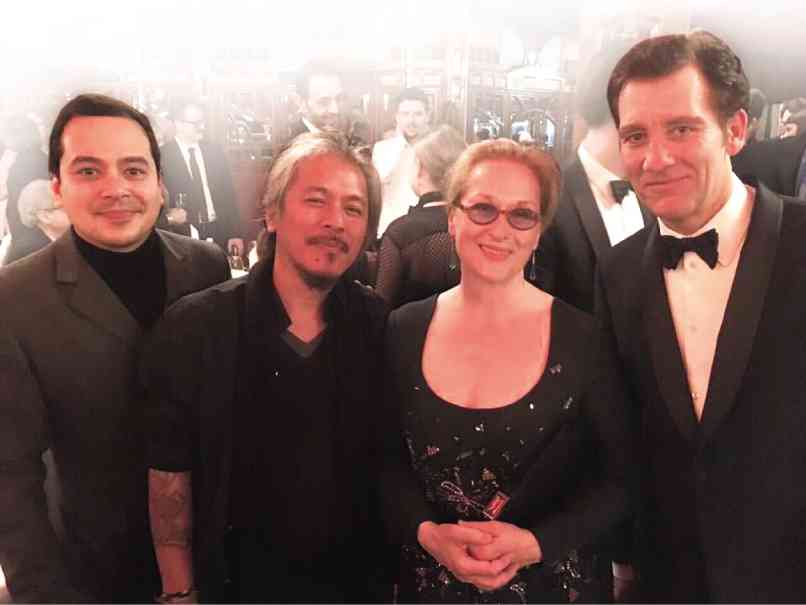
AT THE DINNER party for winners (from left): John Lloyd Cruz, Lav Diaz, Meryl Streep and Clive Owen Photo courtesy of Bianca Balbuena
It may not be readily apparent, but the usually laidback and reticent actor John Lloyd Cruz seems truthfully inspired—if not, reinvigorated—by his eight-day trip to Berlin, Germany, where his latest work, Lav Diaz’s “Hele sa Hiwagang Hapis,” brought home the Silver Bear Alfred Bauer Prize.
His words are evidence enough of this revitalized zeal for what he has been doing for two decades now: “My biggest takeaway from the Berlinale is that it has somehow reset my values and deepened my understanding of cinema.”
Specifically, he points out that people should look beyond “the glitz and glamour of show business,” which, he concedes, is the main preoccupation hereabouts. “Yes, movies should be entertaining. But beyond fame, films should be about what you want to say … what you want to tell the world.”
Pretty strong words from a man who is acknowledged as a box-office champion and much-sought-after product endorser. But then again, he is likewise regarded as among the best thespians of his generation.
Right questions
“In Berlin, I saw that film should be the focus of attention,” he tells the Inquirer in an exclusive interview.
During press conferences held after the screening and the awarding, he recounts, most of the questions were directed at Diaz and the craft of filmmaking. Reporters weren’t remotely curious about an actor’s love life or what he had for breakfast.
“The journalists asked the right questions,” he recalls. “That’s the way it should be.”
Needless to say, he relished this relative freedom from his celebrity. “All throughout the festival, I never felt the ‘star’ status usually given to actors.”
They were all equal—just film buffs worshipping at the altar of cinema in one of the world’s top three film fests.
Cruz managed to squeeze in four movies—in spite of his hectic stay in Germany.
“I saw the German film, ‘24 Weeks’ [by Anne Zohra Berrached], ‘Creepy’ [by Kiyoshi Kurosawa] from Japan, ‘Genius’ [by Michael Grandage], which stars Jude Law and Colin Firth, and Spike Lee’s ‘Chi-Raq,’ which reminded me of Mike de Leon’s ‘Kakabakaba Ka Ba?’”
He also got the chance to act like a movie fan—when he met Oscar-winning actress and jury president Meryl Streep, and Oscar nominee and jury member Clive Owen—during the dinner held in honor of the winners. “That was a pleasant surprise,” he owns up.
He thought he would never get to meet them. “We didn’t see much of Meryl during the premiere. Maybe she wanted to give us (the Philippine team) the floor that time.”
But at the dinner party, Streep sought out the “Hele” cast and crew. “Meryl was genuinely nice and warm. Same with Clive,” he looks back. She made it a point to talk to each of them. “And we were a big, noisy group. There were 20 of us in our table.”
He says the Hollywood A-listers wanted to know about the filmmaking process in the Philippines. “She asked us how long was the shoot in the rainforest. They found our guerrilla filmmaking style amazing.”
He asserts that the hype machine should not make a big fuss of his photo with Meryl, which, he admits, went viral on Twitterverse.
“But I hope all this attention would help popularize the film and Lav among our countrymen,” he remarks.
He saw with his own eyes how Diaz was feted like a rock star in Europe. “Reporters mobbed him. That is so sad because he has to struggle for years to get his films made here.”
He recalls that foreigners were keenly interested in Diaz’s influences and processes. “Of course, there was also this annoying question about the length of the film,” he asserts.
“Hele” runs for eight hours—two hours shorter than Diaz’s previous epic, “Ebolusyon ng Isang Pamilyang Pilipino.”
“A film’s length should not matter,” Cruz clarifies. “A film should be free.”
The cinematic philosophy of Diaz, whom Cruz describes as a humble and self-effacing artist, has become his guiding principle as an actor. “He is now a significant factor in how I will approach my choices.”
Lest his home studio Star Cinema suddenly panics, Cruz swiftly explains: “It doesn’t necessarily mean that I will go against my current plans and commitments. But what will guide my acting decisions will be adherence to the truth.”
Does this mean that he will act in, and produce, more indie films?
“I don’t see that as impossible,” he quips. “I may go into producing, not necessarily directing. The other day, my friends and I were talking about making a short film.”
He speaks with the passion of a fresh convert. “It should be revolutionary. I want this to be the beginning … the birth of a new creation. As Lav would often tell us. ‘The door is now open. The rest is up to you.’”